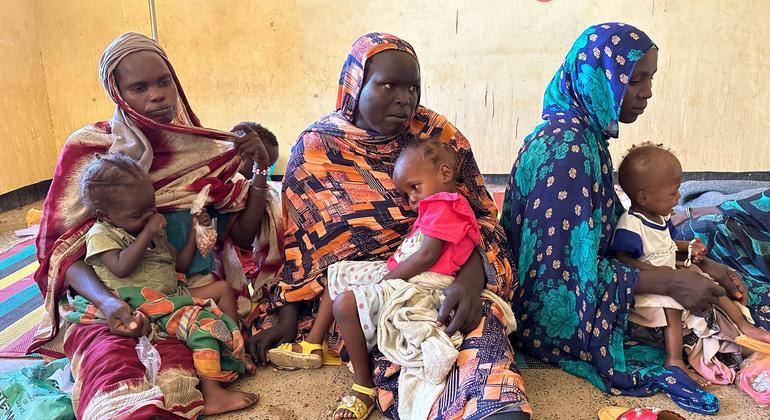The warning comes from the UN children’s agency UNICEF, which said levels of severe wasting in children under five remain very high in several countries due to conflict, economic crises and climate crises.
Deadly condition
Severe wasting – also known as severe acute malnutrition – is caused by a lack of safe, nutritious food and repeated attacks of diseases, such as diarrhoea, measles and malaria.
Children become dangerously thin and their weak immune systems make them vulnerable to stunted growth, poor development and death.
RUTF is an energy-dense micronutrient paste made from milk powder, peanuts, butter, vegetable oil, sugar and a blend of vitamins and minerals.
It has helped bring millions of children back from the brink of death. of severe malnutrition.
“Over the past two years, an unprecedented global response has scaled up nutrition programs to contain child wasting and associated mortality in countries severely affected by conflict, climate and economic crises, and the resulting maternal and child nutrition crisis,” said Victor. Aguayo, Director of Nutrition and Child Development of UNICEF Víctor Aguayo.
“But Urgent action is needed now to save the lives of almost two million children fighting this silent killer..”
A staff member spoon-feeds a four-month-old child at a hospital in Punjab province, Pakistan (file).
Stock is running out
UNICEF said the shortage of RUTF is already leaving children at risk of not receiving treatment in the 12 most affected countries.
Mali, Nigeria, Niger and Chad are already experiencing or facing imminent shortages, while Cameroon, Pakistan, Sudan, Madagascar, South Sudan, Kenya, the Democratic Republic of the Congo and Uganda could run out of stocks by mid-2025.
The situation in the African Sahel region is exacerbated by prolonged droughts, floods and erratic rainfall. This is causing food shortages and high food prices and subsequently higher levels of severe wasting.
For example, more than 300,000 children under five in Mali are expected to suffer from severe wasting this year, but nutrition programs began running out of RUTF supplies in late July.
Meanwhile, the Government of Chad declared a food and nutrition emergency in February, and more than 500,000 children under five are expected to suffer from severe wasting this year. Provinces with large refugee populations are particularly affected.
Approximately 315,000 children in the country received treatment between January and August. Although needs remain urgent, RUTF stocks could run out by the end of this month.
‘There is no time to waste’
UNICEF seeks $165 million to fund food, treatment and therapeutic care for the two million children at risk of death, in an update to its There is no time to waste plan.
The initiative was launched in 2022 to respond to the global food and nutrition crisis. Since then, UNICEF has raised more than $900 million to expand programs, services and supplies for the prevention, early detection and treatment of childhood wasting.
As a result, 21.5 million children and women received essential serviceswhile 46 million children received early detection services and 5.6 million accessed life-saving treatments.
There is no time to waste 2024 describes the urgent funding shortfalls that are putting young lives at risk. The appeal also emphasizes the need for continuity of local manufacturing of essential nutritional supplies, which is vital to sustain interventions and improve community resilience against malnutrition.
Child Nutrition Fund
To address severe long-term child malnutrition, UNICEF launched the Child Nutrition Fund (CNF) last year, with support from the UK Foreign and Development Office, the Bill & Melinda Gates Foundation and the Fund Foundation. of Investment for Children.
CNF’s objectives include supporting local and regional production of fortified foods, dietary supplements and RUTF for young children in areas experiencing high levels of child malnutrition in an effort to avoid global supply chain disruptions, reduce the environmental impacts of shipments and boost job opportunities and economic growth. within communities.
Once fully implemented, the CNF will help protect countries from funding shortages and fluctuations in demand that are currently driving some of the growing RUTF shortages.




